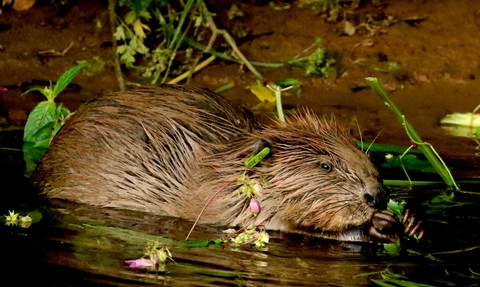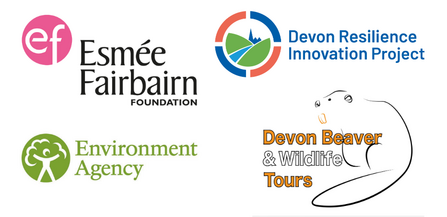
Male beaver on River Otter, photo David White
Our work with beavers
Beavers on Devon rivers
Devon is in the unique position of being the only county in England with thriving beaver populations on several rivers. In addition to the beavers in the River Otter catchment - whose story is set out in more detail on this page - there are beaver populations confirmed in the River Tamar catchment, the River Taw catchment, and the River Exe catchment.
DWT's beaver conservation team work directly with landowners where beavers are present, finding ways for them to benefit from making space for beaver-created wetlands, and providing practical interventions where beaver activity is causing unwanted impacts.
David Parkyn
Beavers are legally protected in England
On 1 October 2022 the legislation changed to protect wild-living beavers in England, making them a 'European Protected Species' and classifying them as a native animal. Beavers are now protected under the Conservation of Habitats and Species Regulations 2017 which means it is an offence to deliberately capture, injure, kill or disturb beavers, or damage and destroy their breeding sites or resting places without a wildlife management license from Natural England.
You can read the full Government policy paper here.
What we do
On the Otter, the Tamar, the Taw, and the Exe, and anywhere else where beavers are reported, DWT staff share their knowledge and understanding of beavers’ behaviour, and provide the support and assistance local people might need to live alongside beavers again.
We monitor populations, check on beavers’ welfare when necessary, and resolve any conflicts between beavers’ use of the landscape and the needs of landowners and the local community. If you have a query about possible beaver activity near you, please visit our Need help with beavers page.
DWT is grateful to Esmée Fairbairn Foundation, the Devon Resilience Innovation Project (DRIP) and The Benindi Fund for funding to support our beaver conservation work.
Devon Beaver & Wildlife Tours specialises in evening walks for small groups to see beavers and other wildlife around East Devon. Its support for the project’s work in the Otter Valley this year is mainly thanks to many donations from people joining those popular walks.
Many thanks also to DWT members and to donors to our Beaver Believers fundraising appeal, which you can click here to support.
Find out more
- learn more about beavers (https://www.devonwildlifetrust.org/beaver-faqs-and-research)
- River Otter Beaver Trial (https://www.devonwildlifetrust.org/what-we-do/our-projects/river-otter-beaver-trial)
- Where to see beavers (https://www.devonwildlifetrust.org/where-see-beavers)
- Beavers on your land (https://www.devonwildlifetrust.org/beavers-your-land)
- Making space for beavers (https://www.devonwildlifetrust.org/making-space-beavers)
A timeline of our work with beavers
River Otter Beaver Trial Timeline
In 2014, beavers were discovered living wild in east Devon. The origin of the population is unknown, though is presumably the result of an escape or unsanctioned deliberate release.
In July 2014, Defra announced its intention to catch and remove the wild beavers, rehoming them in captivity. Devon Wildlife Trust spent much of 2014 developing an alternative proposal: England's first ever wild beaver trial.
Following enthusiastic support from the local community, Natural England granted Devon Wildlife Trust permission to begin a five year monitoring project - the River Otter Beaver Trial. The Trial oversaw the population, range and health of the beavers, and the effect they had on the local landscape and people.
Some of the key milestones are outcomes from this trial are:
- In June 2015, the first baby beavers to be born as part of England's first wild beaver trial were filmed on the river Otter.
- In 2018, the beavers were recorded moving into new areas and creating dams and ditches to create wetland habitat which holds more water in the landscape, and filtering silt and agricultural chemicals out of water. Both reduce flooding downstream.
- In 2020, Devon Wildlife Trust released the River Otter Beaver Trial report, which demonstrated that the reintroduction of beavers on the River Otter improved water quality, reduced flood risk downstream and benefitted other wildlife, such as otters and kingfishers.
- Devon Wildlife Trust were thrilled that in August 2020 the Government announced the pioneering decision to allow the beavers to stay in their wild home! Read more about this announcement here.
- In March 2025 the government took the decision to allow more beavers to live in the wild across the country. This is a landmark decision and you can read our response here.
Can I visit?
Yes, there is good public access alongside the River Otter. There is now evidence of beaver activity from Honiton to Budleigh Salterton, a distance of around 12 miles.
Devon Beaver Project Timeline
In March 2011, a pair of juvenile Eurasian beavers were released into a three hectare fenced enclosure on private land in northern Devon. The objectives of the project were to use beavers to restore an area of nationally important wet grassland and to understand the effects that this once-native species will have on this environment.
This project aims to study the effects that beavers have on these wetlands. This will help to inform future decisions about the potential reintroduction of this species into the wider countryside. The effects of the beavers are being monitored using water quality tests, flora and fauna surveys and fixed-point photography.
The effects on the compound were astounding – the dense willow canopy had been opened up and the culm grassland beneath reawakened; a dynamic, diverse and bewitching tangle of habitats had been created by the beavers who had transformed what was a small trickle of water through the site into an amazing series of waterways.
The project continues to monitor the ecological effects the beavers are having on their environment – from changes in the vegetation composition to effects on the populations of amphibians, bats and breeding birds. Work with the University of Exeter found that the presence of beavers at this site had a profound impact on the ability of the land to hold water, reduced the sediment load in the surface water and an increase in biodiversity had been recorded. View the latest Devon Beaver report here and find out more about the project here.
There are more than 20 beaver territories in the River Otter catchment. The latest arrivals in 2022 are five kits (young beavers) to one of the original females, known as Pink Tag.
Can I visit?
Sorry, access to the site is by invitation only for safety reasons and to minimise disturbance.
Support Devon's beavers

Esmee Fairbairn Foundation, Devon Resilience Innovation Project, Environment Agency, Devon Beaver & Wildlife Tours
Devon Beaver & Wildlife Tours specialises in evening walks for small groups to see beavers and other wildlife around East Devon. Its support for the project’s work in the Otter Valley this year is mainly thanks to many donations from people joining those popular walks.

Work with landowners where beavers are active on the River Tamar was generously funded by Devon Environment Foundation in the crucial period between the end of the River Otter Beaver Trial and the government consultation on the future of beaver re-introductions in England.
